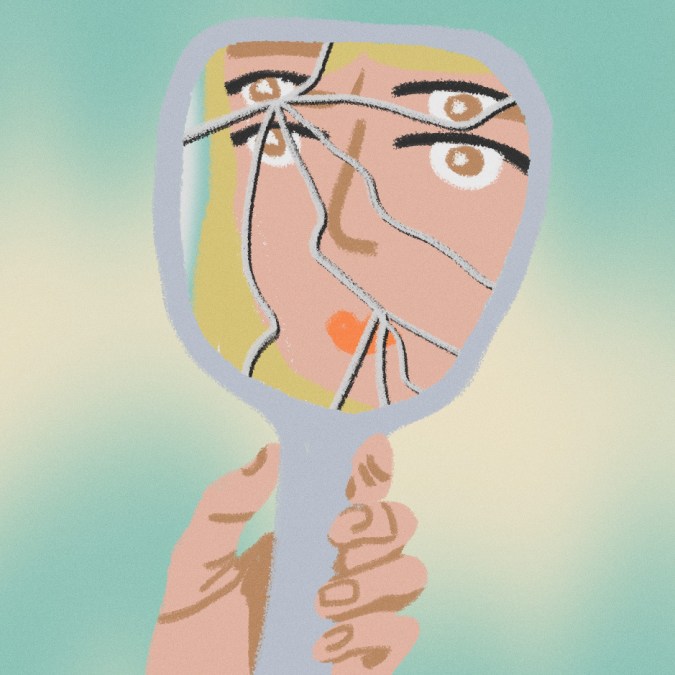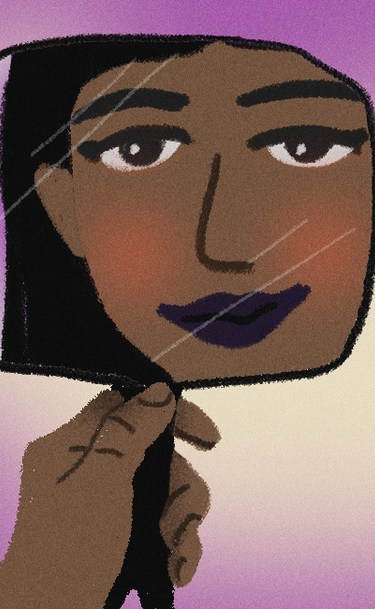In light of the madness that was Jessica Krug’s article and subsequent quitting, this feels like a good time for us to talk about racism and the mirror we run from. In order for us to mend and have an honest conversation about how folks like Krug get away with Black-fishing, we have to break down how much we as a society like to tiptoe around race, phenotypes, and how we identify vs how we are racialized. The mirror is a good place to start.
Unlike Krug, I did not have the privilege to wake up and decide to be Black. I have Type 4 hair, a light to medium skin complexion and what is considered (according to google), a Nubian nose. In other words, my Blackness walks into the room before I even do. I didn’t need a DNA test to tell me I’m Black because I am racialized as such. At a young age, I learned that the Black experience is lit but also filled with many micro-aggressions, heartaches, and dehumanizing experiences. To add insult to injury, I also had to grapple with being Black with roots in the Dominican Republic, a country that seldom showcases phenotypically Black women on TV.
“We have some unpacking to do.”
Like many of my Black friends who have roots in Spanish-speaking countries, I turned to the term Afro-Latinx to deal with the erasure I felt within Latinx culture and media. Unsurprisingly, non-Black Latines sometimes use “Afro-Latinx” to claim their 3-5% Black roots and take up space by centering themselves in narratives they do not live. By doing so, they White-wash the meaning of Afro-Latinidad which, by definition, is a Black person who is racialized as Black with roots in Latin-America.
Now that I’ve shown you my mirror, let’s get back to yours. If you are a Latinx person reading this, then you know we have some unpacking to do. Latinidad has a long history of pretending to be a united front of multi-colored people who sing, dance and share happy smiles as they eat the same richly seasoned food and live a paradisal life. “We are all in this together” and “we are all mixed with a little bit of everything” are common phrases for some Latines, when in reality the only people who benefit from those blanket statements of identity are people like Krug—who are White and able to morph into whatever and whoever they want to be while gaslighting folks who question their false identities. In order to remove the facade, we have to reckon with the mirror.


“It’s so interesting that racism was built based on a measure of phenotypes and suddenly folks don’t know what a Black person looks like?” Major Nesby tells Remezcla about the absurdity of how Non-Black folks suddenly do not see color.
Nesby is a New York-based Black creative who, like myself, opts out of claiming Afro-Latinidad and instead chooses to identify and connect with Black diasporic folks.
Some Latines love to say “light skin” when speaking about White Latines who obviously have White skin. As a light-skinned Black woman, it is completely troubling when folks who are 5-8 shades lighter than me think we both belong to the same pigmented category. This is also a co-opting of Black vernacular that has been used to reference shades of Black skin. In Spanish-speaking countries with Black populations, terms like rubia, blanca, morena, negra, jaba, etc. are used to classify women in terms of race and phenotypes. In addition, there is a historical pattern of upward mobility correlating to the lighter a Black person’s skin is. All in all, as much as we think we have evolved past this history, its legacy is still impacting Black folks in oppressive and life-altering ways.

“Latinidad has a long history of pretending to be a united front…”
So, colorism and featurism clearly play a role in the clownery that is Krug’s and Latindad’s scam. If we believe that the machine of White-Supremacy is steeped in ensuring the destruction of Black lives, then we must grapple with the systems that exist to destroy, isolate, and systemically disadvantage Black folks. Featurism is defined by Dear Dark Skinned Girl as “a prejudice towards individuals with certain features and a preference towards those with features that correlate with a set beauty standard… This is where featurism intertwines so closely with colorism. The Afro-centric features criticized when on black women are praised when on white women.”
Here are some questions I recommend we all ask ourselves on figuring out racial identities:
- How are you racialized? How do you identify?
- Does your racialization make your life harder or easier?
- Do you feel taxed because of your physical features? If so, in what ways?
- Do you feel that you are an in defense of communities & folks that face unequal treatment because of prejudiced systems that target non-white folks?
- Are you anti-racist? (Anti-racism is the policy or practice of opposing racism and promoting racial tolerance.)
- Reflect on a moment where you have implemented anti-racist actions to make the world a better place.
So, the next time you see a Latinx Karen walking around calling herself light-skinned when she means to say White or stating that she is White-passing when she should just look in the mirror, feel free to educate her on the ways in which she is being complicit within structural anti-Blackness.





